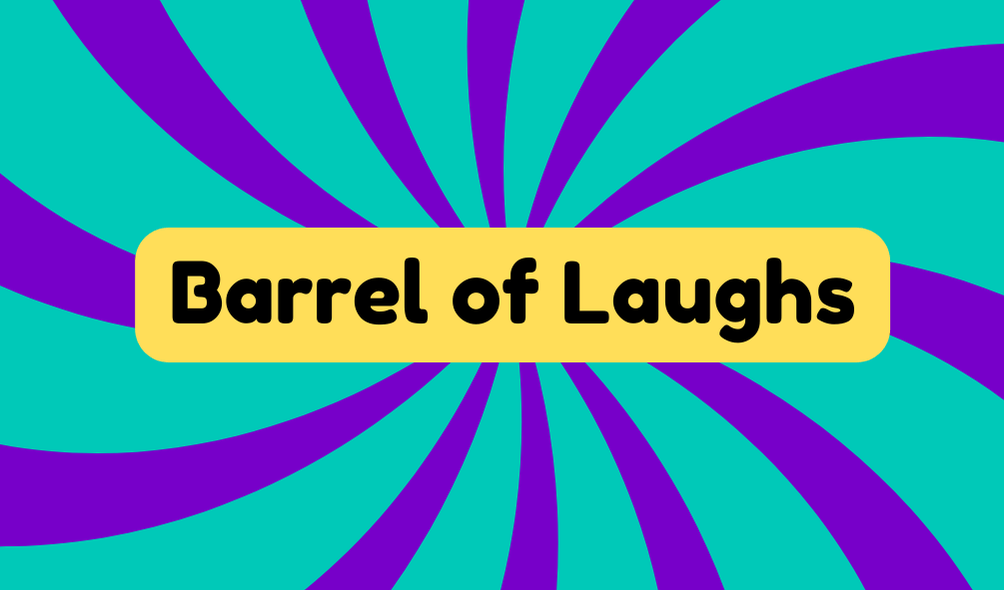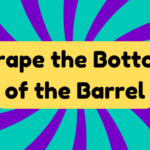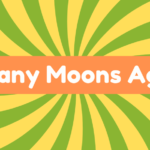The expression "barrel of laughs" refers to a plentiful source of humor, often used to describe events or people that consistently generate laughter. Its origin traces back to cultural entertainment forms like vaudeville, with the phrase first recorded in 1947. Example sentences include, "Family gatherings often turn into a barrel of laughs." This imagery of a barrel suggests an overflowing abundance of joy. While this phrase remains popular, it is crucial to use it appropriately to avoid misunderstandings in humor. The ongoing significance of humor in social interaction warrants a closer look at how such expressions adapt over time.
Synonyms
Synonyms for "barrel of laughs" encompass a range of expressions that convey humor and enjoyment. These synonyms not only reflect the lively spirit associated with comedy but also highlight the nuances of humor techniques that could serve as effective laughter therapy. Here are some compelling alternatives:
- Bundle of laughs
- Hilarious
- Amusing
- Riotous
- Jocular
While these terms contribute to the rich tapestry of language, it is vital to critically assess their use in various contexts. Emphasizing humor's significance offers insights into social interactions and mental well-being. However, we must remain aware that not every funny moment leads to genuine joy, ultimately urging a thoughtful approach to how we incorporate humor into our lives.
Example of Sentences
Several examples highlight the usage of the idiom "barrel of laughs" in everyday language. This phrase often surfaces in contexts emphasizing various humor styles and the laughter benefits they bring. Consider the following sentences:
- The comedian created a barrel of laughs, evoking roars of laughter from the audience.
- Family gatherings consistently turn into a barrel of laughs with jokes and stories.
- Long trips become a barrel of laughs when traveling with friends.
- The movie kept everyone entertained and was considered a barrel of laughs from start to finish.
- Working with Jim is a barrel of laughs due to his plethora of funny stories.
These examples illustrate how humor infuses joy into our lives, promoting well-being and positive social interactions. Yet, the reliance on humor can also raise questions about substance in our engagements.
Origin
Understanding the origins of the idiom "barrel of laughs" enhances its cultural significance and popular usage in language today. While the specific roots remain ambiguous, this phrase symbolizes an abundant source of humor. Its imagery evokes a barrel filled with laughter, pointing to the idiomatic expressions that reflect joy and amusement. This phrase is believed to have connections to vaudeville and circus acts, where performers used barrels to entertain and attract crowds. Additionally, it is intriguing to regard how humor evolution has influenced language. The phrase's first notable appearance in The 20th Century Dictionary in 1947 highlights its mid-20th-century adoption, showcasing a continuous interplay between laughter and linguistic development through the ages.
Collocations
The idiom "barrel of laughs" is often used in combination with various collocations that enhance its meaning and application in everyday language. These expressions encapsulate the essence of humor trends and comedic timing, reflecting a dynamic approach to humor.
- Always a barrel of laughs
- Barrel of laughs with friends
- Turn into a barrel of laughs
- A real barrel of laughs
- Heard a barrel of laughs
Utilizing these collocations effectively conveys the vibrancy and unpredictability of humor. However, it is crucial to note that while such phrases evoke merriment, the nuances vary widely. In contemporary contexts, reliance on trendy expressions without understanding their roots can dilute the genuine connection that laughter fosters, potentially leading to a disjointed comedic experience.
How to Use in Everyday Language
Incorporating the idiom "barrel of laughs" into everyday language can effectively convey humor and lightheartedness in various contexts. This expression is particularly useful when discussing humorous situations, whether they arise in casual conversations or social gatherings. Using the phrase empowers individuals to articulate moments of joy and levity, enhancing social cohesion. Additionally, it aligns with concepts like laughter therapy, which emphasizes humor's benefits to mental health. However, while invoking this idiom can foster a positive atmosphere, it is essential to guarantee that humor remains inclusive and relatable. Overuse or misapplication may dilute its impact, potentially alienating some audiences. Therefore, while enjoying humor, one must navigate its deployment thoughtfully and authentically.
Why Is It Still Relevant Today?
Humor remains an essential aspect of human interaction, and expressions like "barrel of laughs" continue to resonate within contemporary discourse. This idiom captures the enduring cultural impact of humor, serving as a reminder of our collective need for joy and connection. In a world inundated with stress and challenges, humor appreciation becomes crucial, allowing individuals to engage socially and emotionally. Yet, as humor evolves, the effectiveness of traditional expressions warrants scrutiny; they may resonate differently across diverse audiences. While the phrase retains relevance, we should be wary of overusing outdated idioms that might lose their potency. Ultimately, humor's role in fostering connection should encourage ongoing exploration of innovative expressions that reflect our dynamic culture.







